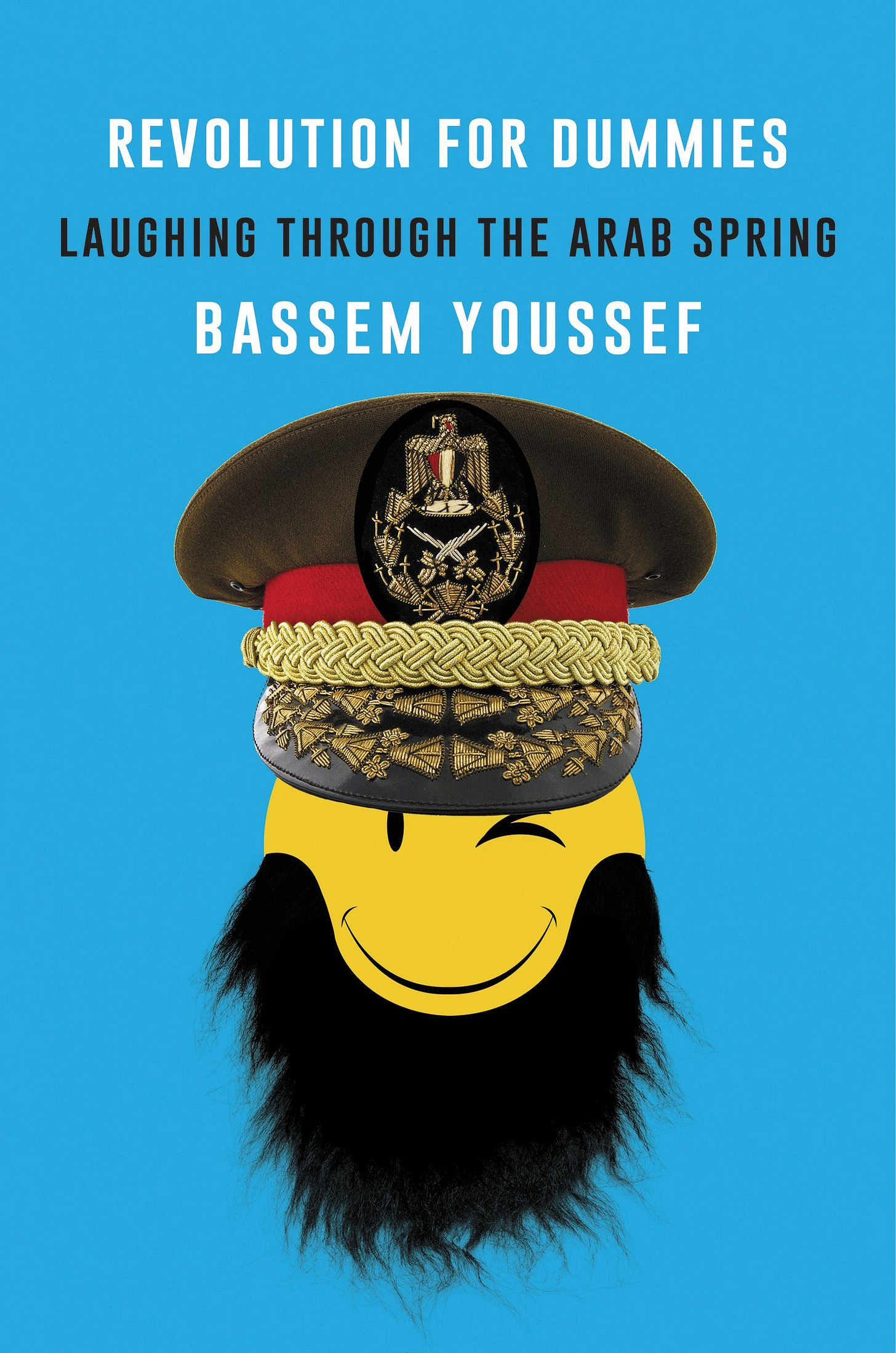Did Anyone Else Read 'Revolution For Dummies'?
Would the Egyptian Jon Stewart think it's safe to laugh at the Arab Spring yet?
Okay, you caught me. This book isn’t in the original reading list that I put in my very first ever blog post. This book isn’t even translated. Bassem Youssef just went and wrote this in English and then released it to a predominantly American audience. It’s not fiction either. It’s a memoir. I wanted to remind all of you that this is my blog and I’m the one who holds all the power so anything goes here so long as I say it does. Which is also why this isn’t getting published on a regular Friday. Not because I can’t get my life together or anything. I think there’s a theme starting to emerge here.
The confessions aren’t over. I read this book for the first time back when it was originally released in 2017. I, being an Indiana resident, had to special order my copy from my local Barnes & Noble. I represented the only demand in the area for the writings for an at-the-time fugitive political satirist from Egypt. No one here cared who this man was and they didn’t register how universal his cultural moment was no matter how many appearances he made on The Daily Show. Normally a cashier will make some kind of encouraging comment while ringing me up about the kind of books I’m buying and how my choices are really interesting. Not when this book came in. They were so confused as to what led me down this road because it’s so far removed from anything nor is it anywhere close to what happens in Indiana of all places.
The Arab Spring happened when I was an awkward early teenager and I have a lot of core memories watching the entire country stop to watch and laugh at Bassem Youssef’s show. It knit everyone together and it was really powerful; the kind of power that annoyed and threatened new, unpopular and humorless governments to no end. I also have a lot of core memories of many of my elders living out their final days letting us know all of their opinions on just how good every joke was and how things used to be run during the Nasser and Sadat eras and how much better it was back then. There was order and prosperity then. People knew how to act and what to say and where their place was. But we aren’t discussing my memoir. My life is nowhere near as interesting as Youssef’s.
Youssef will be the first to tell you that he is not by any means a political expert. And I’m going to follow suit. Go find a helpful YouTube explainer that can help you understand Egypt during the early 2010’s. He is the man who made a few jokes in a laundry room and so was plucked out of relative obscurity. He came to be the voice of the people until the people decided he wasn’t anymore. In a time where everyone was deciding what kind of government they wanted they were also deciding where the line was in merely joking around. Bassem Youssef became a bastion of the fears, frustrations and attitudes of the people when it was clear there was a need for an outlet lest there be more demonstrations and violent clashes. The options were either to laugh or cry or worse up until the option was to flee.
“One man silently walked toward me and put his hand on my shoulder. “We need you to avenge us,” he said somberly. “You are the only one who speaks in our voice.””
- Page 96
During the narrative, Youssef takes up a crusade against organized hypocrisy. He genuinely wants his people to be respected by the institutions clinging onto to power to govern over them. However he came to realize that the greatest hypocrites came from the very “liberals” that once lauded his consistent and hilarious takedowns of the Islamists that were supposed to be the refreshing change after 30 years of the same Mubarak-era schlock people got tired of. The realization was that there was no liberalism to be found. No conservative living in their own perfect world would ever want to put with, let alone give any responsibilities to, anyone or anything resembling any type of political left. All there was were people with big egos jostling for power. If there was someone in the public eye neatly showing the entire country all the ways in which politicians are breaking promises, lying and being ridiculous then the new standard being held up starts to feel threatening. The type of change people took to the streets, and some even died, for got firmly rejected. The devil you know, right?
So what happened? Youssef had to leave Egypt because he made too many enemies in high places. His choice was to make another mundane talkshow that pacifies but doesn’t satisfy anyone involved or he had to leave. In hindsight, Bassem Youssef ended up right where a lot of the authority figures wanted him. He came to the United States to juggle medicine and comedy with a few appearances here and there and a healthy career as an author of this memoir and children’s books to make sure his daughter doesn’t grow up with too much generational trauma.
“[…] his satire was not purposeful for regime change but […] his satire was purposeful for expression.”
- Jon Stewart making a speech in reference to Youssef, page 210
Now the revolution is looked at as a reset where people needed to vent out their pent up anger much in the same way hair needs bleaching following every bad breakup. The pressure has to get let out somehow. It was a weird and interesting time and it’s over and virtually no one wants to talk about it because there is really no point. The whole thing is largely inconsequential. It didn’t amount to the radical change young people wanted it to at the time and everyone is reconciled to that. The only thing to do is wait for your moment of respite and laugh.





